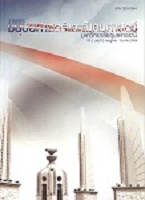ปัญหาการใช้ตราประทับในเช็ค
Main Article Content
บทคัดย่อ
บทความเรื่องนี้มีวัตถุประสงค์เพื่อศึกษาถึงปัญหาการใช้ตราประทับในเช็คตามที่ธนาคารแห่งประเทศไทยได้ห้ามการจ่ายเงินตามเช็คที่มีตราประทับเนื่องจากธนาคารแห่งประเทศไทยมีการนำเอาระบบ ICS ซึ่งเป็นระบบการใช้สีแบบขาวดำ และเฉดสีเทามาใช้ทำให้ไม่สามารถตรวจสอบลายมือชื่อได้เพราะสีของลายเส้นจะทับซ้อนกัน จากการศึกษา พบว่าการใช้ตราประทับมี 2 กรณี คือ 1) การใช้ตราประทับแทนการลงลายมือชื่อตามมาตรา 900 วรรค 2 ประกอบมาตรา 9 วรรค 2 ปกติการใช้ตราประทับแทนการลงลายมือชื่อจะต้องมีลายมือชื่อพยานด้วย 2 คน จึงอาจทำให้มีปัญหาการตรวจสอบเพราะการใช้ตราประทับในกรณีต้องมีพยานลงลายมือชื่อด้วย จึงทำให้เกิดปัญหาอันเนื่องมาจากการนำเอาระบบ ICS มาใช้ตรวจสอบลายมือชื่อได้ 2) การใช้ตราประทับของนิติบุคคลซึ่งการลงลายมือชื่อของผู้แทนนิติบุคคล โดยปกตินิติบุคคลจะมีข้อบังคับโดยมีผู้แทนลงลายมือชื่อพร้อมตราประทับสำคัญ การสั่งห้ามดังกล่าวอาจทำให้การสั่งจ่ายเช็คไม่ผูกพันนิติบุคคล เพราะจะทำให้สั่งจ่ายเช็คโดยไม่ชอบด้วยข้อบังคับของนิติบุคคล เช่นนี้จึงควรให้นิติบุคคลแก้ไขข้อบังคับให้สามารถสั่งจ่ายเช็คด้วยการลงลายมือชื่อโดยไม่ต้องใช้ตราประทับ หรือนิติบุคคลให้สัตยาบันแก่การลงลายมือชื่อนั้น หรืออาจให้ผู้แทนนิติบุคคลเขียนว่ากระทำการแทนนิติบุคคลตามมาตรา 901
Problems of Using a Stamp with a Cheque
This article aimed to study the problem of using a stamp to sign a cheque as the Bank of Thailand prohibits ordering payment of money by a cheque using a stamp due to the implementation of Imaged Cheque Clearing System (ICCS) System. The system uses grayscale and black and white images, so the signature may not be able to be inspected due to the overlapping color scale. The study found that there were 2 cases involving the use of a stamp. The first case was under Section 900 Paragraph 2 and Section 9 Paragraph 2 of Thailand’s Civil and Commercial Code in which the use of a stamp required 2 witnesses’ signatures. Therefore, it might be difficult to verify the stamp because of the colored images. The second case was when a company as a juristic person used the stamp instead of signing in person. In normal circumstances, if a juristic person wanted to use a stamp, 2 company delegates’ signatures were required. The mentioned prohibition of the Bank of Thailand may oppose the rights of the juristic person because it is unlawful to order a payment for the cheque. Therefore, firstly, the juristic person should be able to amend the regulation to allow the signature on the cheque without a stamp. A second option is that the juristic person can ratify the signatures of the delegates. Thirdly, the company may require the delegates to state that their signatures are made on the company’s behalf.
Article Details
บทความที่ได้รับการตีพิมพ์เป็นลิขสิทธิ์ของวารสารมนุษยศาสตร์และสังคมศาสตร์ มหาวิทยาลัยอุบลราชธานี
ข้อความที่ปรากฏในบทความแต่ละเรื่องในวารสารวิชาการเล่มนี้เป็นความคิดเห็นส่วนตัวของผู้เขียนแต่ละท่านไม่เกี่ยวข้องกับมหาวิทยาลัยอุบลราชธานี และคณาจารย์ท่านอื่นๆในมหาวิทยาลัยฯ แต่อย่างใด ความรับผิดชอบองค์ประกอบทั้งหมดของบทความแต่ละเรื่องเป็นของผู้เขียนแต่ละท่าน หากมีความผิดพลาดใดๆ ผู้เขียนแต่ละท่านจะรับผิดชอบบทความของตนเองแต่ผู้เดียว


